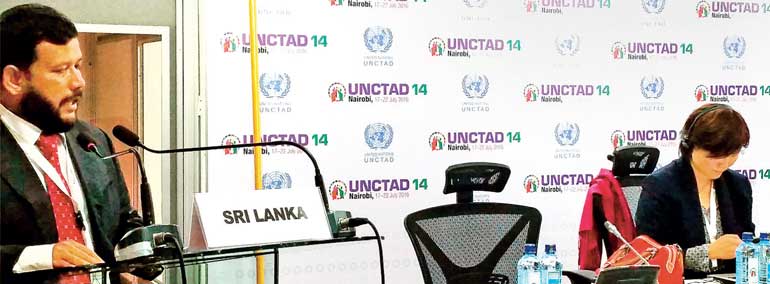Saturday Feb 21, 2026
Saturday Feb 21, 2026
Wednesday, 20 July 2016 00:00 - - {{hitsCtrl.values.hits}}

Industry and Commerce Minister Rishad Bathiudeen addresses the 14th session of the UN Conference on Trade and Development, which was broadcast live on webtv.un.org on 19 July from the Kenyatta Conference Centre in Nairobi
Having achieved remarkable progress with its Millennium Development Goals (MDGs), Sri Lanka called for global support over its Sustainable Development Goals (SDGs) at the UN Conference on Trade and Development (UNCTAD 14) on 19 July in Nairobi, Kenya.
“We are optimistic that with active engagement with necessary resources and capacity development assistance from international agencies, we may be able to reach sustainable development targets for 2030,” stressed Industry and Commerce Minister Rishad Bathiudeen.
Bathiudeen was speaking at the 14th session of the conference, which was broadcast live on webtv.un.org from the Kenyatta Conference Centre in Nairobi. The 14th UNCTAD in Nairobi will conclude on 22 July.
Themed ‘From Decisions to Actions’, it features ministerial debates, high-level round table discussions, a World Investment Forum, a Global Commodities Forum, a Youth Forum and a Civil Society Forum, among others. Minister Bathiudeen is leading the Lankan delegation to Nairobi.
“Four years ago when we met in Doha, Qatar in April 2012, we all expressed our concerns over the status of global economic, trade, financial and environmental conditions. Today after four years we are here to continue our discussion on those with added concerns,” said Minister Bathiudeen.
“The global economy has shown a slow phase of development. Performance in global trade has been lower than what we predicted. Gaps in the per capita income still remain wide. Inclusive socioeconomic development addressing poverty, hunger, food security, unemployment, inequality, access to renewable energy and technology, the adverse effect on climate change, industrialisation and the diversification of economies, opportunities for innovation and development and becoming partners in the global value chain are still major problems encountered by developing countries.”
“These concerns are differently reflected in such economies depending on the size, population and availability of resources and other socioeconomic factors in those countries. Many reports published by the World Bank, IMF, WTO, United Nations and Global Economic Forum have focused on these developments. The global risks perceptions have further accelerated those concerns. Decisions made, in particular, at the United Nations Agenda for 2030, the Addis Ababa Action Agenda of the Financing for Development, the Sendai Framework for Disaster Risk Reduction 2015-2030, the Paris Agreement on Environment and the 10th WTO Ministerial Conference held in Kenya focusing on the current issues in the global environment may direct us towards a crucial integrated role that could be played by the key international institutions concerned.
“Smaller economies such as Sri Lanka’s rely highly on a multilateral trading environment for fair and inclusive global trade engagement. However, foreseeable challenges arising from volatility in the global trade and financial markets with a tendency to have the preference enjoyed by smaller economies getting eroded are critical factors that require serious consideration. My delegation believes the current theme of this Ministerial Conference from ‘Decisions to Actions’ would therefore be timely.
“When actions are formulated, it is vital for these international agencies to define their engagements and cooperate with each other for collective benefits to their members. In this exercise, member countries should be able to secure adequate policy space and flexibility to choose between different policy options within the context of bilateral, regional and international agreements. We believe that it is of great importance to have such policy space, particularly for developing countries in order to formulate their development strategies in line with their national interest and development needs.
“We experienced different sets of challenges towards sustainable growth. Sri Lanka has been able to find a solution to the prolonged 30 years of internal conflict in 2009. However, we are facing a number of challenges including rebuilding, reconstruction and commitments towards a sustainable living environment for people in the affected areas of the country, despite challenges experienced from the uncertainty stemming from the volatile global economic environment. The recent development in the country’s political culture and its commitment to economic development has been gradually developing an enabling environment for economic prosperity. Sri Lanka has remarkably achieved Millennium Development Goal targets in many areas,” he said.
“My delegation is fully associated with the Ministerial Declaration of the Group of 77 and China. We strongly believe that UNCTAD can play a critical role in facilitating the countries in need of technical and other assistance towards achieving their sustainable development targets. Sri Lanka has benefitted from UNCTAD’s expert services in many areas of its development activities. As a country with greater desire towards marching for sustainable development goals, Sri Lanka continues to rely on UNCTAD’s active engagement in the process,” Minister Bathiudeen stated.
Kenyan President Uhuru Kenyatta inaugurated UNCTAD14 on 17 July in a glittering afternoon ceremony. No less than 6,000 global delegates are taking part in Nairobi’s UNCTAD14 event.